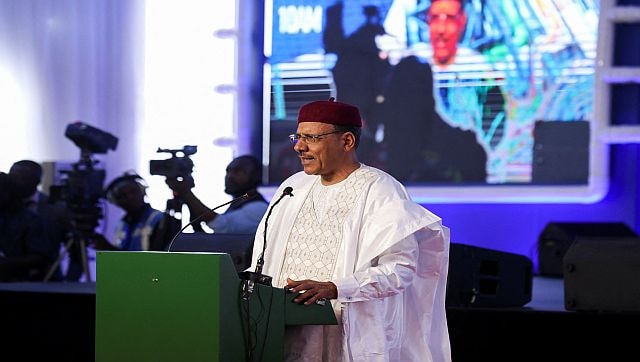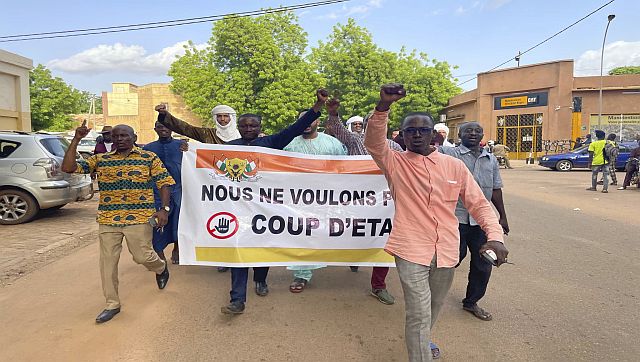As Sahel countries such as Mali and Burkina Faso fall to military junta rule in recent years, Niger’s Mohamed Bazoum stood as one of the region’s few remaining pro-Western, democratically elected leaders. He came to power in 2021 — the country’s first president to do so in a peaceful transition — and later called that a “reflection of the maturity of the people and the wisdom of the leaders.” However, on Thursday, he appeared to have fallen to a coup himself, as soldiers from the
Presidential Guard
claimed to have overthrown his government. The rebels have held
President Mohamed Bazoum
in his residence since Wednesday, while other bodies of the Army have refused to join the uprising. According to the Presidency of Niger’s Twitter account, “The Army and the National Guard are prepared to attack the elements of the Presidential Guard involved in this action if they do not return to reason.” It was unclear where the president was at the time of the announcement of the coup or if he had resigned. A report from Indian Express stated that hundreds of people reportedly took to the streets of the capital, Niamey, chanting “No coup d’etat” in support of the president before the announcement. One of the protesters attempted to reach the presidential palace but was dispersed with warning shots by the rebels, as per El Pais, a Spanish daily newspaper. Some sources close to the government told El Pais that they suspect the man behind the mutiny is General Omar Tchiani, head of the Presidential Guard, who feared being dismissed in the coming days. Mohamed Bazoum never far from coup threat Born in 1960 in the southeastern region of Diffa, a member of Niger’s Arab minority, Bazoum studied in the southern cities of Goure and Zinder before leaving to study philosophy in Senegal. He taught there for six years in provincial high schools, honing his oratorical skills. On his return home, he got involved in union activities and was — along with fellow future president Mahamadou Issoufou — a founding member of the Nigerien Party for Democracy and Socialism (PNDS). During Issoufou’s decade as president from 2011, Bazoum was his right-hand man and served in different ministries. Well-connected at home and abroad, he left office in mid-2020 to devote himself to the presidential election, which he eventually won with more than 55 per cent of votes cast. [caption id=“attachment_12922092” align=“alignnone” width=“640”] Just days before Mohamed Bazoum was sworn in, the government announced the arrest of several people after an alleged putsch attempt. File image/Reuters[/caption] Entering office, he said he intended to ensure “continuity” with Issoufou’s administration. “His name is not mentioned in the main corruption scandals that have often tarnished the regime,” said Ibrahim Yahaya Ibrahim, researcher at the International Crisis Group. “He is recognised for a certain rigour in the management of public affairs.” In its fight against the jihadist attacks that afflict the west and east of the country, Niger has benefited from the support of several Western countries including the United States and former colonial power France, which have military bases there. A few months after the withdrawal of French troops from Burkina Faso, 1,500 French soldiers are still in Niger. As the security crisis endures, coup threats have never been far away. Just days before he was sworn in, the government announced the arrest of several people after an alleged putsch attempt. Among those held were the suspected ringleader, air force captain Sani Gourouza, and former interior minister Ousmane Cisse. Five people, including Gourouza, were sentenced to 20 years in prison in February, while Cisse was acquitted. A second bid to oust Bazoum occurred last March “while the president… was in Turkey”, according to a Niger official, who said an arrest was made. The authorities have never commented publicly on the incident. ‘Deeply concerning’ The attempt to oust President Bazoum sparked concern both locally and internationally. The chairman of the African Union Commission, Moussa Faki Mahamat, condemned “in the most vigorous manner this attempt to seize power by force” and urged the coup plotters to release Mohamed Bazoum “immediately and unconditionally.” [caption id=“attachment_12922162” align=“alignnone” width=“640”]
Just days before Mohamed Bazoum was sworn in, the government announced the arrest of several people after an alleged putsch attempt. File image/Reuters[/caption] Entering office, he said he intended to ensure “continuity” with Issoufou’s administration. “His name is not mentioned in the main corruption scandals that have often tarnished the regime,” said Ibrahim Yahaya Ibrahim, researcher at the International Crisis Group. “He is recognised for a certain rigour in the management of public affairs.” In its fight against the jihadist attacks that afflict the west and east of the country, Niger has benefited from the support of several Western countries including the United States and former colonial power France, which have military bases there. A few months after the withdrawal of French troops from Burkina Faso, 1,500 French soldiers are still in Niger. As the security crisis endures, coup threats have never been far away. Just days before he was sworn in, the government announced the arrest of several people after an alleged putsch attempt. Among those held were the suspected ringleader, air force captain Sani Gourouza, and former interior minister Ousmane Cisse. Five people, including Gourouza, were sentenced to 20 years in prison in February, while Cisse was acquitted. A second bid to oust Bazoum occurred last March “while the president… was in Turkey”, according to a Niger official, who said an arrest was made. The authorities have never commented publicly on the incident. ‘Deeply concerning’ The attempt to oust President Bazoum sparked concern both locally and internationally. The chairman of the African Union Commission, Moussa Faki Mahamat, condemned “in the most vigorous manner this attempt to seize power by force” and urged the coup plotters to release Mohamed Bazoum “immediately and unconditionally.” [caption id=“attachment_12922162” align=“alignnone” width=“640”] Niger Army spokesman Colonel Major Amadou Adramane speaks during an appearance on national television, after President Mohamed Bazoum was held in the presidential palace, in Niamey, Niger. Reuters[/caption] The president of the Economic Commission of West African States (ECOWAS), the Nigerian Bola Tinubu, said: “We will not accept any action that disturbs the proper functioning of the legitimate authority in Niger or anywhere in West Africa.” UN Secretary-General António Guterres also condemned the attempted coup in Niger “with the utmost firmness” and called for the maintenance of constitutional order in the African country. For his part, White House National Security Adviser Jake Sullivan issued a statement stating that the United States is “deeply concerned” by the latest developments and condemns “any attempt to subvert the democratic government” of Niger. “In particular, we demand that elements of the Presidential Guard release President Bazoum and prevent violence,” said adviser to US President Joe Biden, reports El Pais. Insurgency in Sahel Mohamed Bazoum has been a crucial ally for Western powers in combating the jihadist insurgency in the Sahel region. The country has played a pivotal role in regional security efforts. Niger’s counterinsurgency measures have included military action as well as community participation, sparing the country from the worst consequences. However, the region remains unstable, with two coups in Mali, two in Burkina Faso, and one in Guinea since 2020. While military efforts and civilian participation have had some success in combating the insurgency, the region’s overall security picture remains difficult. The state in West Africa faces severe poverty, and its human development index ranks among the lowest globally. With a growing population, Niger has to deal with the severe circumstances of the parched Sahel and the consequences of a high birthrate. A successful coup in such a time might have far-reaching consequences, opening up opportunities for other parties to exert influence. With inputs from AFP
Niger Army spokesman Colonel Major Amadou Adramane speaks during an appearance on national television, after President Mohamed Bazoum was held in the presidential palace, in Niamey, Niger. Reuters[/caption] The president of the Economic Commission of West African States (ECOWAS), the Nigerian Bola Tinubu, said: “We will not accept any action that disturbs the proper functioning of the legitimate authority in Niger or anywhere in West Africa.” UN Secretary-General António Guterres also condemned the attempted coup in Niger “with the utmost firmness” and called for the maintenance of constitutional order in the African country. For his part, White House National Security Adviser Jake Sullivan issued a statement stating that the United States is “deeply concerned” by the latest developments and condemns “any attempt to subvert the democratic government” of Niger. “In particular, we demand that elements of the Presidential Guard release President Bazoum and prevent violence,” said adviser to US President Joe Biden, reports El Pais. Insurgency in Sahel Mohamed Bazoum has been a crucial ally for Western powers in combating the jihadist insurgency in the Sahel region. The country has played a pivotal role in regional security efforts. Niger’s counterinsurgency measures have included military action as well as community participation, sparing the country from the worst consequences. However, the region remains unstable, with two coups in Mali, two in Burkina Faso, and one in Guinea since 2020. While military efforts and civilian participation have had some success in combating the insurgency, the region’s overall security picture remains difficult. The state in West Africa faces severe poverty, and its human development index ranks among the lowest globally. With a growing population, Niger has to deal with the severe circumstances of the parched Sahel and the consequences of a high birthrate. A successful coup in such a time might have far-reaching consequences, opening up opportunities for other parties to exert influence. With inputs from AFP
How Niger president Mohamed Bazoum always faced a threat of a coup
FP Explainers
• July 27, 2023, 11:37:12 IST
Niger president Mohamed Bazoum, a pro-Western, democratically elected leader, fell victim to a coup attempt by soldiers from the Presidential Guard. He took power in 2021, and his reputation has remained unscathed by corruption scandals, but threats of taking over have always been there
Advertisement
)
End of Article